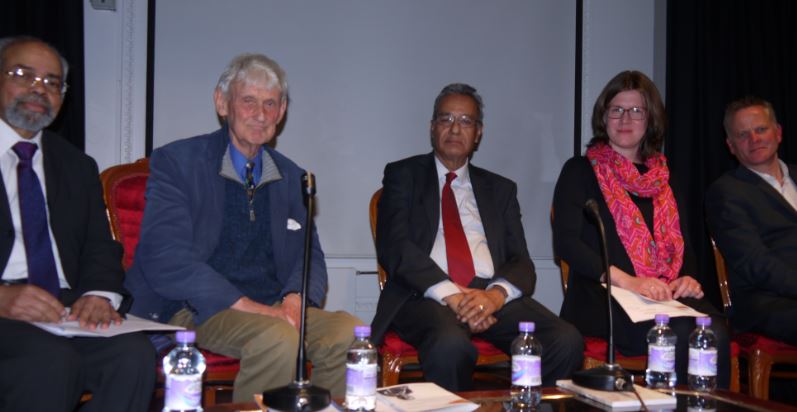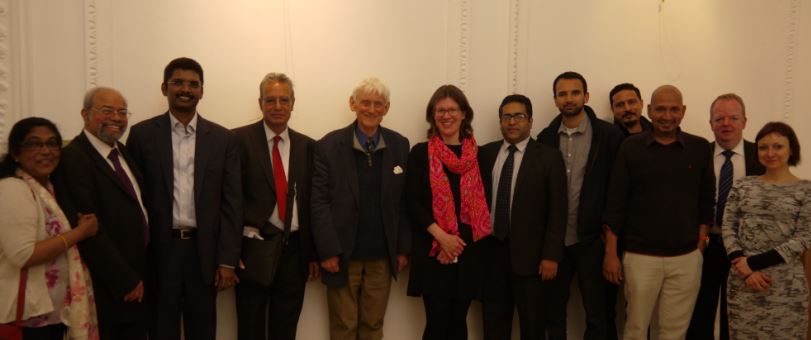London, The 121st birth anniversary of V K Krishna Menon, former defence minister of India, was celebrated at the Nehru Centre here this week with speakers recalling his contributions to India's independence, particularly "fighting the Lion in its own den."
In his opening address, Dr Cyriac Maprayil, Director of the V K Krishna Menon Institutute, said "people of Indian origin and friends of India try to remind themselves of the sacrifices made by leaders like Gandhiji, Sardar Patel, Pandit Jawaharlal Nehru, Subash Chandra Bose and Dr B R Ambedkar but "we forget the indispensable and crucial role played by Krishna Menon on the final stage of India's independence movement."
Dr Maprayil said Menon made lasting and memorable contributions. Menon came to  London to study. After his studies he stayed on in London. He entered local politics and was in 1934 elected as a borough councillor in the London Borough of St Pancaras. He worked selflessly and tirelessly for the welfare of those in the borough. He became chairman of the library committee in 1945 and set up a travelling library to take books to the residents who could not find time to travel to the library. Later he set up paperback publications to make books available for students at affordable price.
London to study. After his studies he stayed on in London. He entered local politics and was in 1934 elected as a borough councillor in the London Borough of St Pancaras. He worked selflessly and tirelessly for the welfare of those in the borough. He became chairman of the library committee in 1945 and set up a travelling library to take books to the residents who could not find time to travel to the library. Later he set up paperback publications to make books available for students at affordable price.
Dr Maprayil said though Menon was living in London he did not forget his people back in India. "Side by side with his other activities he was campaigning for India's independence using various platforms including the Labour party, India league and trade union movement."
He said "Menon fought the lion in its own den singlehandedly carrying out the Indian war for liberation right in the heart of the enemy territory. He established the India League as an integral part of Indian national struggle and persuaded well known intellectuals like philosopher Bertrand Russell to be its chairman."
Dr Maprayil said Menon's work among the people of Britain as well as within the labour party prepared Britain and the Labour government to part with power when, of course it became almost inevitable after the second World War.
he said after India became independent, Menon joined Pandit Nehru, the first Prime Minister and they together were the architects of India's policy towards the Commonwealth which made it possible for India to become a republic and at the same time to be a member of the Commonwealth.
Menon was appointed as India's First High Commissioner in London and his contribution to cementing close relationship between Britain and India was hailed even by Britain's then Prime Minister Winston Churchill as a  magnanimous gesture on India's part.
magnanimous gesture on India's part.
Subsequently on his appointment as India's Permanent Representative at the United Nations, Menon contributed a great deal in conflict resolution whether it was Suez , Congo, Korean or Indoa-China crises. "Nehru and Krishna Menon brought a healing touch to International Relations at the height of the Cold War. "Menon was one of the key people who played a major part in shaping opinion in Britain and throughout the world in those critical years," Maprayil said.
Dr Kate Sullivan De Estrade, Lecturer, Oxford University, described Krishna Menon as the most controversial diplomat and "a key person in dismantling the western power." According to her, Menon's "Indian contemporaries also painted him as a rude and difficult person." She said "Menon believed in power through consent and security through peace." Many western leaders disdained him as an "upstart and Nehru's evil genius," she said.
Dr Dev Sharma, Councillor and Community activist, said Menon lived a simple life and was a role model for him.
Sir Peter Lloyd, former Minister, said Menon was a brilliant but extraordinarily difficult person. He hailed Menon's ability as an impressive diplomat. "Menon's crowning achievement was his contribution to Non-Alignment which gave the newly independent nations a sense of autonomy.
Howard Spencer, Senior Historian at the English Heritage, spoke about Menon's contribution to the welfare of the people of Britain.Tony Slater ,a Board Member , of the Institute in his summing-up speech emphasised how Menon's work among the people of Britain in general as well as within the labour party in particular prepared Britain and the labour government to part with rule over India after the second world war..